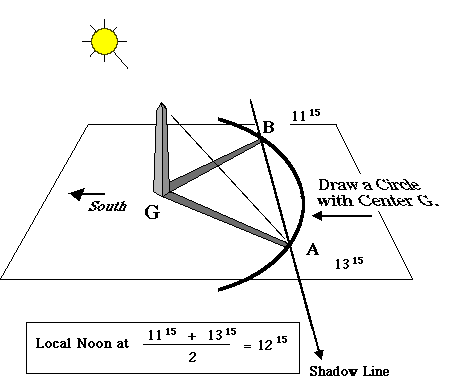
gnomon [noh-mon] ExamplesWord Origin See more synonyms for gnomon on Thesaurus.com noun
- the raised part of a sundial that casts the shadow; a style.
- an early astronomical instrument consisting of a vertical shaft, column, or the like, for determining the altitude of the sun or the latitude of a position by measuring the length of its shadow cast at noon.
- Geometry. (formerly) the part of a parallelogram that remains after a similar parallelogram has been taken away from one of its corners.
Origin of gnomon 1540–50; Latin gnōmōn pin of a sundial Greek gnṓmōn literally, interpreter, discerner Related Words for gnomon dial, clock, watch, chronometer, calendar, chronograph, repeater, metronome, pendulum, horologe, chronoscope, gnomon, sundial, stopwatch, clepsydra, hourglass, time-keeper Examples from the Web for gnomon Historical Examples of gnomon
No doubt, however, it was a sun-dial, or gnomon of some kind.
George Chambers
There is therefore in every Parallelogramme a double Gnomon; as in these two examples.
Peter Ramus
The Gnomon is any one of the Diagonall with the two complements.
Peter Ramus
But I landed in the dark chamber of a Gnomon, waist-deep in loose wheat.
Ellsworth Douglass
I mounted the only unsealed Gnomon and shouted down into its cavernous depths.
Ellsworth Douglass
British Dictionary definitions for gnomon gnomon noun
- the stationary arm that projects the shadow on a sundial
- a geometric figure remaining after a parallelogram has been removed from one corner of a larger parallelogram
Derived Formsgnomonic, adjectivegnomonically, adverbWord Origin for gnomon C16: from Latin, from Greek: interpreter, from gignōskein to know Word Origin and History for gnomon n.
“vertical shaft that tells time by the shadow it casts” (especially the triangular plate on a sundial), 1540s, from Latin gnomon, from Greek gnomon “indicator,” literally “one who discerns,” from gignoskein “to come to know” (see gnostic (adj.)).
 Liberal Dictionary English Dictionary
Liberal Dictionary English Dictionary